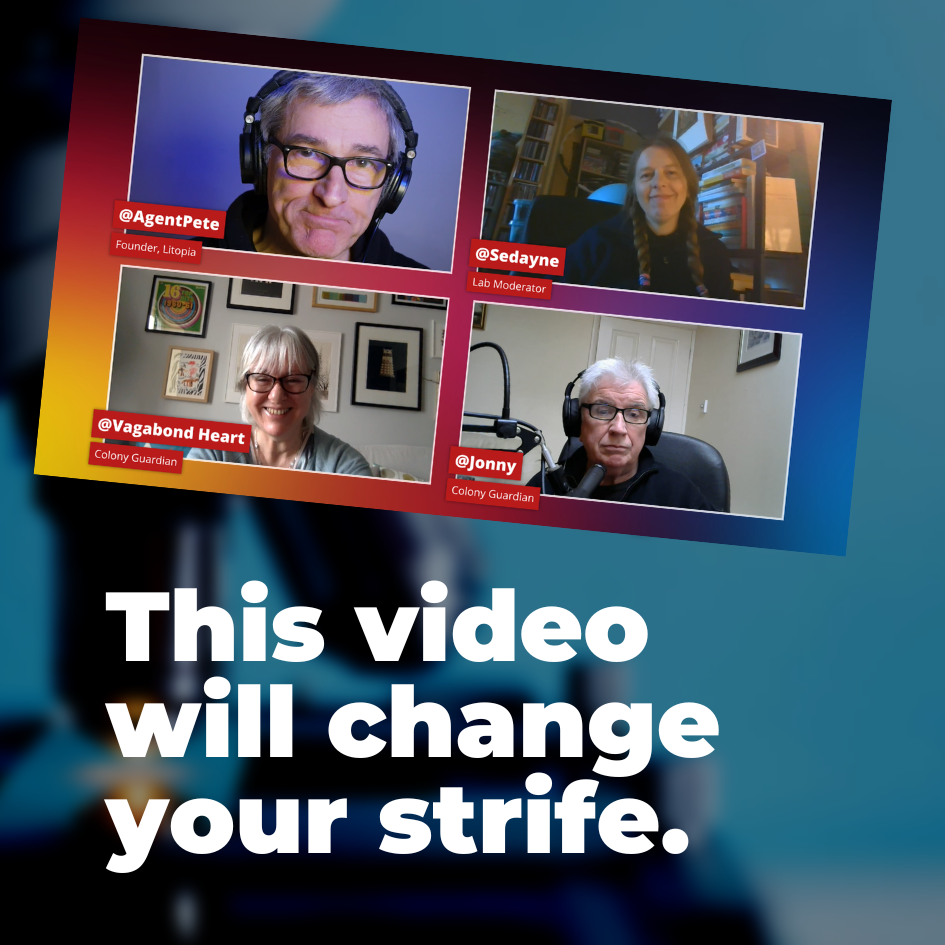C
Carol Rose
Guest
DIALOGUE - PART ONE
This post is about two things: a basic overview of punctuating dialogue, and how to write dialogue that accomplishes The Big Three:
Gives the reader new/important information
Moves the story forward
Shows characterization
Do you need to do all three with every line of dialogue you write? No, but if you can accomplish that, it will keep your story tight and help remove the fluff. As we’ve discussed in past CC posts, narrative should be confined to what’s needed in the story to move it forward. If it’s not relevant, it doesn’t belong in there.
Some writers get the narrative tightened up nicely, but when they get to the dialogue part, for some reason they feel compelled to write every “um,” “eh,” and “Hey how are? Oh just fine, and you?” The result? The exchange moves at a snail’s pace and is boring. We start skimming right past the chit chat.
But Carol, the chit chat is realistic. Isn’t that what we’re trying to accomplish with dialogue? Make it real?
Yes, and no.
We want reality, in that we want our characters to sound authentic. We want them to speak to each other the same way real people do. But we speak in chit chat and incomplete sentences most of the time. The small talk when we first get to work and greet our co-workers. The casual stop on the street to speak with someone we know, or have recently been introduced to. The “How are you doing?’ phone conversations with family members or friends. But if you break down the dialogue in books, you’ll see that most authors keep that to a minimum, or avoid it entirely.
Think of it this way. If you were to give someone directions, would you include such steps as walk down the stairs, or turn on the engine of your car? No, because those steps are assumed. You would only hit the high points. The important points. The steps that will get that person from A to B. Turn left here, turn right there, go past this building, etc.
We do the same thing when we pare down the dialogue in stories. We skip the assumed parts. The chit chat stuff. The small talk about the weather or about the weekend you had. That’s not to say it might not be important for a particular scene to include some of that, but we don’t need to begin every single exchange between two or more people with the assumed stuff.
As an example, and I see this a lot with newer writers (and unfortunately some seasoned ones!) starting every single phone call with the “Hello, this is so-and so” and “Hello, how are you?” back and forth between the characters. If we know who is making the call and who they are calling, that is not needed. It gives the writing an amateurish feel. Just step right into the conversation and get on with it. The writing is tighter that way, and you’re only giving your readers what they need in that conversation.
The same thing goes for in-person conversation in stories. Nothing is more boring than scrolling through paragraphs and paragraphs of chit-chat before finally getting to the point. It’s tempting when you’re uncomfortable with meaningful dialogue to toss in everything you imagine you’d say to someone in that situation, but ninety percent of it likely isn’t needed.
Let’s write out a scene as an example. First, I’ll include everything, only I’m not going to include dialogue tags or action in this example. I want you to concentrate solely on the dialogue. This is between John and Sally who have known each other a long time, are good friends, and are having a chat over coffee…
“Hi John.”
“Hi Sally.”
“How are you?”
“I’m fine, and you?”
“Oh, okay. You know.”
“Having one of those days?”
“Yeah. It’s nothing. Really.”
“Well, Sally, it’s obviously something.”
“You don’t want to hear it.”
“Sure I do. Tell me.”
“Well, only if you’re sure.”
“I wouldn’t have asked otherwise.”
“You’re such a great friend.”
“So are you.”
“Well, okay. I had a call from Margie late last night.”
“That’s the cousin who broke up with her boyfriend, right?”
“Yeah, that one.”
“The same one who got caught shoplifting?”
“Yeah. She’s a peach.”
“So what did she call you about this time?”
“She was in jail.”
“What? She called you from jail?”
“No, she called me after she got released on bond.”
“Why was she arrested?”
“She’s back with the boyfriend.”
“That’s why she was arrested?”
“No. She was arrested with him.”
“For what?”
“You’re not going to believe this.”
“Try me.”
“They vandalized a building.”
“What?”
“Some gas station where he used to work.”
“Why?”
“They fired him and he wanted revenge.”
“And Margie decided it would be a good idea to help him do that?”
“Apparently so.”
“What an idiot.”
“No kidding.”
“What does she expect you to do?’
“Lend her money, of course.”
“For what?”
“An attorney.”
“She can use a public defender.”
“She wants the best for herself and Derek.”
“Are you going to do it?”
“Hell no. I have better things to spend my money on right now.”
“Uh-oh.”
“What?’
“That tone in your voice. I know you, Sally. What else is going on?”
“I finally had the CT scan.”
“For your abdominal pain?”
“Yes.”
“And?”
“And I’m sick.”
“Sick how?”
“John, I have colon cancer.”
Okay. So what was the new information in this exchange? We found out Sally has cancer. That’s certainly new and important. Is the information about her dumbass cousin new? It sounds more like the same old, same old. So is it important to the story? Not as important as telling a good friend you have cancer.
If the story was about Sally’s cousin it might be important, but clearly it’s not. And even if the story was about Sally’s cousin, there are much tighter ways to write that information.
It’s all small talk, chit chat, and fluff until you get to the last line, isn’t it? And it was boring as heck to read. Even with dialogue tags and action added, that would have been a silly exchange right up to the end. It might be realistic, in that you can see two people actually having that conversation, but does it belong in a story, word-for-word like that? No.
That exchange took 281 words without tags or action, and all we learned was one important fact. Sally has cancer. Add in a few tags and some action, and we’d likely double the word count, but would still only convey one important fact to the reader.
So let’s rewrite that, still without any tags or action, but this time we’ll take out the fluff…
“Having one of those days, Sally?”
“Yeah. I had a call from Margie late last night.”
“What is it this time? Another break-up? Did she steal something else?”
“Close. She called me after she got released on bond. Apparently she’s back with Derek, and they both thought it would be a good idea to vandalize the gas station where he got fired from, to get revenge.”
“What an idiot. What does she expect you to do?”
“Lend her money, of course. She wants the best attorney for them.”
“Tell her that’s what public defenders are for. You have better things to spend your money on.”
“Isn’t that the truth.”
“What’s going on?”
“I finally had the CT scan.”
“And?”
“John, I have colon cancer.”
That only took 124 words. Same information, but the focus is on the last line instead of the useless back-and-forth about Margie and Derek before we finally get to the meat of it. Add in a couple of tags and some action, and you have a powerful scene that gives the reader important information, moves the story forward, and shows characterization.
Economy of words doesn’t have to be confined to narrative. And, to give your readers a balanced story, it shouldn’t be. You need to exercise the same constraint with the dialogue as well.
Just as we drop our readers into the middle of the protagonist’s main conflict at the start of a story, it’s all right to jump into the middle of a conversation, too. You only need a line or two of action, and perhaps a dialogue tag, to ground them in the Who is speaking, Why are they speaking, When are they speaking, What are they talking about, and Where they are.
Yes, the same Big Five we talked about in Setting can be incorporated for each scene of dialogue. This is usually easily accomplished because you’ve set up most of this in the context of the story beforehand. But keep it in mind if this is the first time we’re meeting the characters, if time has passed in the story, or if we’ve changed the place where the characters are when the dialogue begins.
Before we get to punctuation, I want to call your attention to what's known as the "As you know, Bob" way of writing dialogue. If your characters already know something, and as a reader you know they know, don't be tempted to explain backstory or history in this way. It's an obvious plot device and comes across as both amateurish and fake. Here's an example...
"I had a call from Steve last night."
"You mean our cousin Steve?"
"Yes, Aunt Betty's oldest son."
If this is two people, especially adults, related to each other, they already know Aunt Betty's oldest son is named Steve, and Steve is their cousin. Don't be tempted to give your reader an extended family tree by having two adults define the members of that tree in a conversation like this. No one speaks to a cousin or a sibling this way. It's not realistic.
I could give tons of other examples, but hopefully with this short one you get the big picture.
On to punctuation. Instead of tacking on this part inside a future Craft Chat post that will deal with grammar and punctuation basics, I’ve decided to put it here because it makes more sense.
Nothing ruins a great story faster than simple punctuation mistakes. One or two will be overlooked if the story is wonderful and the dialogue is engaging. But if you make the same mistakes every single time someone in the story speaks, that submission will be tossed aside. Fixing simple mistakes like that is YOUR job. It shows you’re a professional, and you care enough to learn the basics of the craft and make sure your story shows that.
Before a dialogue tag, use a comma unless the sentence ends in a question mark or an exclamation mark. However, in both instances, the first word of the tag is NOT capitalized.
“Let’s go see a movie,” she said.
“Do you want to go see a movie?” she asked.
If the dialogue comes after the tag, whether or not you use a comma depends on how you frame the dialogue.
John asked Sally, “Do you want to go to a movie?”
John cleared his throat before asking Sally a question. “Do you want to go to a movie?”
In the second two sentences, John clearing his throat is a complete thought. It’s a separate sentence. Trying to write all that as a tag would be awkward and clumsy.
The first word of any sentence in dialogue is capitalized UNLESS you’re breaking up a complete sentence with a tag in the middle.
“Hey, Sally,” said John, “do you want to go to a movie?”
Hey, Sally, do you want to go to a movie? is a complete sentence, so when you break it up with a tag, you still use commas at each end, but the first word of the continued dialogue after the tag is not capitalized.
There are more examples, but these are the basics. Below I’ve included several links where you can read more about punctuating different types of dialogue exchanges. Learn this. Use this. It could mean the difference between a Thanks, but not for us and a Please send the full manuscript email.
8 Essential Rules for Punctuating Dialogue - article
7 Rules of Punctuating Dialogue: How to Punctuate Dialogue Easily
Punctuation in Dialogue
How to Punctuate Dialogue
That’s it! Your turn. Let’s discuss…



